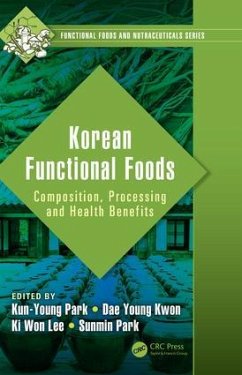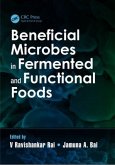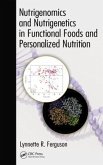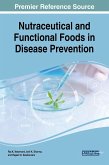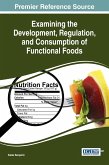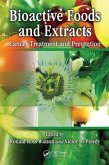Korean Functional Foods
Composition, Processing and Health Benefits
Herausgeber: Park, Kun-Young; Lee, Ki Won; Kwon, Dae Young
Korean Functional Foods
Composition, Processing and Health Benefits
Herausgeber: Park, Kun-Young; Lee, Ki Won; Kwon, Dae Young
- Gebundenes Buch
- Merkliste
- Auf die Merkliste
- Bewerten Bewerten
- Teilen
- Produkt teilen
- Produkterinnerung
- Produkterinnerung
This book provide information related to Korean functional food. It first describes the history and culture of Korean foods, and then compares Korean diet tables with other Asian countries and Western countries.
Andere Kunden interessierten sich auch für
![Functional Foods Functional Foods]() Functional Foods253,99 €
Functional Foods253,99 €![Beneficial Microbes in Fermented and Functional Foods Beneficial Microbes in Fermented and Functional Foods]() Beneficial Microbes in Fermented and Functional Foods286,99 €
Beneficial Microbes in Fermented and Functional Foods286,99 €![Nutrigenomics and Nutrigenetics in Functional Foods and Personalized Nutrition Nutrigenomics and Nutrigenetics in Functional Foods and Personalized Nutrition]() Nutrigenomics and Nutrigenetics in Functional Foods and Personalized Nutrition230,99 €
Nutrigenomics and Nutrigenetics in Functional Foods and Personalized Nutrition230,99 €![Clinical Aspects of Functional Foods and Nutraceuticals Clinical Aspects of Functional Foods and Nutraceuticals]() Clinical Aspects of Functional Foods and Nutraceuticals227,99 €
Clinical Aspects of Functional Foods and Nutraceuticals227,99 €![Nutraceutical and Functional Foods in Disease Prevention Nutraceutical and Functional Foods in Disease Prevention]() Nutraceutical and Functional Foods in Disease Prevention211,99 €
Nutraceutical and Functional Foods in Disease Prevention211,99 €![Examining the Development, Regulation, and Consumption of Functional Foods Examining the Development, Regulation, and Consumption of Functional Foods]() Examining the Development, Regulation, and Consumption of Functional Foods176,99 €
Examining the Development, Regulation, and Consumption of Functional Foods176,99 €![Bioactive Foods and Extracts Bioactive Foods and Extracts]() Bioactive Foods and Extracts247,99 €
Bioactive Foods and Extracts247,99 €-
-
-
This book provide information related to Korean functional food. It first describes the history and culture of Korean foods, and then compares Korean diet tables with other Asian countries and Western countries.
Hinweis: Dieser Artikel kann nur an eine deutsche Lieferadresse ausgeliefert werden.
Hinweis: Dieser Artikel kann nur an eine deutsche Lieferadresse ausgeliefert werden.
Produktdetails
- Produktdetails
- Verlag: CRC Press
- Seitenzahl: 586
- Erscheinungstermin: 8. Mai 2018
- Englisch
- Abmessung: 240mm x 161mm x 36mm
- Gewicht: 1036g
- ISBN-13: 9781498799652
- ISBN-10: 1498799655
- Artikelnr.: 52527726
- Herstellerkennzeichnung
- Libri GmbH
- Europaallee 1
- 36244 Bad Hersfeld
- gpsr@libri.de
- Verlag: CRC Press
- Seitenzahl: 586
- Erscheinungstermin: 8. Mai 2018
- Englisch
- Abmessung: 240mm x 161mm x 36mm
- Gewicht: 1036g
- ISBN-13: 9781498799652
- ISBN-10: 1498799655
- Artikelnr.: 52527726
- Herstellerkennzeichnung
- Libri GmbH
- Europaallee 1
- 36244 Bad Hersfeld
- gpsr@libri.de
Dr. Kun-Young Park is Professor in the Dept. of Food Science and Nutrition, Pusan National University, in Busan, Korea. He earned a food science degree and masters of science at Korea University and completed his PhD in food science at the University of Nebraska . Professor Park's research interests are 1) Korean traditional foods and their cancer prevention and antiobesity effect and 2) Phytochemicals, functional foods, anticancer and antiobesity. Currently his research is on Korean fermented functional foods, such as Kimchi (Korean fermented vegetables), Doenjang (Soybean fermented paste), Kochujang (Red pepper powder-soybean fermented paste), and their chemopreventive and antiobesity effects. He has published approximately 400 research papers and reviews, and have been invited or presented more than 800 papers at domestic or international symposia.Dr. Kwon received his Ph.D. in Biological Science and Biotechnology from the Korea Advanced Institute of Science and Technology in Seoul in 1986. After finishing his postdoctoral training at the Whitehead Institute, MIT, Cambridge, USA, he has started his research as a research scientist at Korea Food Research Institute (KFRI). He worked at KFRI in the field of food biological chemistry. He worked as adjunct professor at Sookmyung Women's University in 1997-2003. He is a representative professor of United University of Science and Technology since 2004. He worked as a Director of Emerging Food Technology Division, Director of Food Convergence, etc. in KFRI. In 2014, he was the president of KFRI. After resigning his position, he worked as an Editor-in-Chief of Journal of Ethnic Foods published by Elsevier and vice-president of Korean Society of Foods and Nutrition. He has studied the anti-metabolic syndrome, and anti-aging food. He had experience to collaboration work with Institute of Food Research (IFR), Norwich, UK. He has published more than 250 research papers in several renowned SCI international journals in the areas of ethnic foods and bioactive food components and those papers were cited about 1,500 times in SCI journals. He is high research achievement as his H-index is about 30. He is a Fellow of Korea Academy of Science and Technology, Korea since 2011.Professor Ki Won Lee had been an assistant and associate professor in Konkuk University from 2006 to 2011, and currently is an associate professor in the Department of Agricultural Biotechnology at Seoul National University in Korea since 2011. He received his Ph.D. in Food Science and Technology from Seoul National University in Korea in 2004, and did his Post-doctoral research in the Hormel Institute at University of Minnesota in USA. He has published more than 230 research articles and review articles on functional foods in a number of prestigious journals including Nature Reviews Cancer, Lancet, and Nature Structure and Molecular Biology, and his research has been cited over 6600 times by peer-review papers and his H-index is 40. He is serving as a director of Emergence Center for Personalized Food-Medicine Therapy System in Advanced Institutes of Convergence Technology, a director of Center for Anti-aging Industry, as well as a director of 6+a Rural Wellness Convergence Center in Korea. He is a CEO of
Contents
Preface.....................................................................................................................
vii
Acknowledgments..................................................................................................ix
Editors.......................................................................................................................xi
Contributors............................................................................................................xv
1 Korean Foods-History, Culture, and
Characteristics............................1
Cherl-Ho Lee
2 Korean Diets and Their
Tastes...................................................................23
Dae Young Kwon and Kyung Rhan Chung
3 Kimchi and Its Health
Benefits...................................................................43
Kun-Young Park and Jaehyun Ju
4 Lactic Acid Bacteria in
Kimchi...................................................................79
Hak-Jong Choi, Jieun Lee, and Ja-Young Jang
5 Health Benefits of Doenjang (Soybean Paste) and Kanjang
(Soybean
Sauce)...........................................................................................
101
Kun-Young Park and Eui-Seong Park
6
Cheongkukjang...........................................................................................
145
Sunmin Park and James W. Daily
7 Biological Functions and Traditional Therapeutic Uses
of Kochujang (Red Pepper
Paste).............................................................. 165
Dae Young Kwon and Soon-Hee Kim
8 Jeotgal (Fermented Fish): Secret of Korean
Seasonings...................... 183
Ok Kyung Koo and Young Myoung Kim
9 Sikcho (Korean
Vinegar)............................................................................
217
Kwang-Soon Shin and Hoon Kim
10 Korean Ginseng: Composition, Processing, and Health Benefits.....233
Boo-Yong Lee
11 Yangnyeom (Spices) and Health
Benefits............................................... 257
Hye-Kyung Na and Young-Joon Surh
12 Seed Oil (Sesame Seed, Perilla
Seed)...................................................... 291
JaeHwan Lee, Mi-Ja Kim, and Mun Yhung Jung
13 Health Benefit Effects of Jukyeom (Bamboo
Salt)................................ 319
Hyung-Min Kim, Jaehyun Ju, Phil-Dong Moon, Na-Ra Han,
Hyun-Ja Jeong and Kun- Young Park
14 Beneficial Effects of Cheonilyeom (a Mineral-Rich Solar
Sea Salt) on Health and
Fermentation..................................................... 341
Jeong-Yong Cho, Lily Jaiswal, and Kyung-Sik Ham
15 Edible Korean Seaweed: A Source of Functional Compounds.......... 359
Sanjeewa K. K. Asanka, Hyun-Soo Kim, and You-Jin Jeon
16 Namul, the Korean Vegetable
Dish.........................................................385
Young-Eun Lee
17 Bibimbap as a Balanced One-Dish
Meal................................................ 421
Youn-Soo Cha
18 Korean Alcoholic Beverages:
Makgeolli/Yakju..................................... 441
Seok-Tae Jeong, Han-Seok Choi, and Ji-Eun Kang
19 Clinical Trials of Some Korean Functional
Foods................................463
Soo-Wan Chae and Su-Jin Jung
20 Functional Food Industry: Processing and
Sanitation........................505
Jin-Hee Lee
21 Regulations of Korean Functional
Foods............................................... 523
Ji Yeon Kim and Yeonkyung Lee
22 Future of Functional Foods in
Korea....................................................... 539
Ki Won Lee, Jong Hun Kim, Sanguine Byun, and Jong-Eun Kim
Index......................................................................................................................553
Preface.....................................................................................................................
vii
Acknowledgments..................................................................................................ix
Editors.......................................................................................................................xi
Contributors............................................................................................................xv
1 Korean Foods-History, Culture, and
Characteristics............................1
Cherl-Ho Lee
2 Korean Diets and Their
Tastes...................................................................23
Dae Young Kwon and Kyung Rhan Chung
3 Kimchi and Its Health
Benefits...................................................................43
Kun-Young Park and Jaehyun Ju
4 Lactic Acid Bacteria in
Kimchi...................................................................79
Hak-Jong Choi, Jieun Lee, and Ja-Young Jang
5 Health Benefits of Doenjang (Soybean Paste) and Kanjang
(Soybean
Sauce)...........................................................................................
101
Kun-Young Park and Eui-Seong Park
6
Cheongkukjang...........................................................................................
145
Sunmin Park and James W. Daily
7 Biological Functions and Traditional Therapeutic Uses
of Kochujang (Red Pepper
Paste).............................................................. 165
Dae Young Kwon and Soon-Hee Kim
8 Jeotgal (Fermented Fish): Secret of Korean
Seasonings...................... 183
Ok Kyung Koo and Young Myoung Kim
9 Sikcho (Korean
Vinegar)............................................................................
217
Kwang-Soon Shin and Hoon Kim
10 Korean Ginseng: Composition, Processing, and Health Benefits.....233
Boo-Yong Lee
11 Yangnyeom (Spices) and Health
Benefits............................................... 257
Hye-Kyung Na and Young-Joon Surh
12 Seed Oil (Sesame Seed, Perilla
Seed)...................................................... 291
JaeHwan Lee, Mi-Ja Kim, and Mun Yhung Jung
13 Health Benefit Effects of Jukyeom (Bamboo
Salt)................................ 319
Hyung-Min Kim, Jaehyun Ju, Phil-Dong Moon, Na-Ra Han,
Hyun-Ja Jeong and Kun- Young Park
14 Beneficial Effects of Cheonilyeom (a Mineral-Rich Solar
Sea Salt) on Health and
Fermentation..................................................... 341
Jeong-Yong Cho, Lily Jaiswal, and Kyung-Sik Ham
15 Edible Korean Seaweed: A Source of Functional Compounds.......... 359
Sanjeewa K. K. Asanka, Hyun-Soo Kim, and You-Jin Jeon
16 Namul, the Korean Vegetable
Dish.........................................................385
Young-Eun Lee
17 Bibimbap as a Balanced One-Dish
Meal................................................ 421
Youn-Soo Cha
18 Korean Alcoholic Beverages:
Makgeolli/Yakju..................................... 441
Seok-Tae Jeong, Han-Seok Choi, and Ji-Eun Kang
19 Clinical Trials of Some Korean Functional
Foods................................463
Soo-Wan Chae and Su-Jin Jung
20 Functional Food Industry: Processing and
Sanitation........................505
Jin-Hee Lee
21 Regulations of Korean Functional
Foods............................................... 523
Ji Yeon Kim and Yeonkyung Lee
22 Future of Functional Foods in
Korea....................................................... 539
Ki Won Lee, Jong Hun Kim, Sanguine Byun, and Jong-Eun Kim
Index......................................................................................................................553
Contents
Preface.....................................................................................................................
vii
Acknowledgments..................................................................................................ix
Editors.......................................................................................................................xi
Contributors............................................................................................................xv
1 Korean Foods-History, Culture, and
Characteristics............................1
Cherl-Ho Lee
2 Korean Diets and Their
Tastes...................................................................23
Dae Young Kwon and Kyung Rhan Chung
3 Kimchi and Its Health
Benefits...................................................................43
Kun-Young Park and Jaehyun Ju
4 Lactic Acid Bacteria in
Kimchi...................................................................79
Hak-Jong Choi, Jieun Lee, and Ja-Young Jang
5 Health Benefits of Doenjang (Soybean Paste) and Kanjang
(Soybean
Sauce)...........................................................................................
101
Kun-Young Park and Eui-Seong Park
6
Cheongkukjang...........................................................................................
145
Sunmin Park and James W. Daily
7 Biological Functions and Traditional Therapeutic Uses
of Kochujang (Red Pepper
Paste).............................................................. 165
Dae Young Kwon and Soon-Hee Kim
8 Jeotgal (Fermented Fish): Secret of Korean
Seasonings...................... 183
Ok Kyung Koo and Young Myoung Kim
9 Sikcho (Korean
Vinegar)............................................................................
217
Kwang-Soon Shin and Hoon Kim
10 Korean Ginseng: Composition, Processing, and Health Benefits.....233
Boo-Yong Lee
11 Yangnyeom (Spices) and Health
Benefits............................................... 257
Hye-Kyung Na and Young-Joon Surh
12 Seed Oil (Sesame Seed, Perilla
Seed)...................................................... 291
JaeHwan Lee, Mi-Ja Kim, and Mun Yhung Jung
13 Health Benefit Effects of Jukyeom (Bamboo
Salt)................................ 319
Hyung-Min Kim, Jaehyun Ju, Phil-Dong Moon, Na-Ra Han,
Hyun-Ja Jeong and Kun- Young Park
14 Beneficial Effects of Cheonilyeom (a Mineral-Rich Solar
Sea Salt) on Health and
Fermentation..................................................... 341
Jeong-Yong Cho, Lily Jaiswal, and Kyung-Sik Ham
15 Edible Korean Seaweed: A Source of Functional Compounds.......... 359
Sanjeewa K. K. Asanka, Hyun-Soo Kim, and You-Jin Jeon
16 Namul, the Korean Vegetable
Dish.........................................................385
Young-Eun Lee
17 Bibimbap as a Balanced One-Dish
Meal................................................ 421
Youn-Soo Cha
18 Korean Alcoholic Beverages:
Makgeolli/Yakju..................................... 441
Seok-Tae Jeong, Han-Seok Choi, and Ji-Eun Kang
19 Clinical Trials of Some Korean Functional
Foods................................463
Soo-Wan Chae and Su-Jin Jung
20 Functional Food Industry: Processing and
Sanitation........................505
Jin-Hee Lee
21 Regulations of Korean Functional
Foods............................................... 523
Ji Yeon Kim and Yeonkyung Lee
22 Future of Functional Foods in
Korea....................................................... 539
Ki Won Lee, Jong Hun Kim, Sanguine Byun, and Jong-Eun Kim
Index......................................................................................................................553
Preface.....................................................................................................................
vii
Acknowledgments..................................................................................................ix
Editors.......................................................................................................................xi
Contributors............................................................................................................xv
1 Korean Foods-History, Culture, and
Characteristics............................1
Cherl-Ho Lee
2 Korean Diets and Their
Tastes...................................................................23
Dae Young Kwon and Kyung Rhan Chung
3 Kimchi and Its Health
Benefits...................................................................43
Kun-Young Park and Jaehyun Ju
4 Lactic Acid Bacteria in
Kimchi...................................................................79
Hak-Jong Choi, Jieun Lee, and Ja-Young Jang
5 Health Benefits of Doenjang (Soybean Paste) and Kanjang
(Soybean
Sauce)...........................................................................................
101
Kun-Young Park and Eui-Seong Park
6
Cheongkukjang...........................................................................................
145
Sunmin Park and James W. Daily
7 Biological Functions and Traditional Therapeutic Uses
of Kochujang (Red Pepper
Paste).............................................................. 165
Dae Young Kwon and Soon-Hee Kim
8 Jeotgal (Fermented Fish): Secret of Korean
Seasonings...................... 183
Ok Kyung Koo and Young Myoung Kim
9 Sikcho (Korean
Vinegar)............................................................................
217
Kwang-Soon Shin and Hoon Kim
10 Korean Ginseng: Composition, Processing, and Health Benefits.....233
Boo-Yong Lee
11 Yangnyeom (Spices) and Health
Benefits............................................... 257
Hye-Kyung Na and Young-Joon Surh
12 Seed Oil (Sesame Seed, Perilla
Seed)...................................................... 291
JaeHwan Lee, Mi-Ja Kim, and Mun Yhung Jung
13 Health Benefit Effects of Jukyeom (Bamboo
Salt)................................ 319
Hyung-Min Kim, Jaehyun Ju, Phil-Dong Moon, Na-Ra Han,
Hyun-Ja Jeong and Kun- Young Park
14 Beneficial Effects of Cheonilyeom (a Mineral-Rich Solar
Sea Salt) on Health and
Fermentation..................................................... 341
Jeong-Yong Cho, Lily Jaiswal, and Kyung-Sik Ham
15 Edible Korean Seaweed: A Source of Functional Compounds.......... 359
Sanjeewa K. K. Asanka, Hyun-Soo Kim, and You-Jin Jeon
16 Namul, the Korean Vegetable
Dish.........................................................385
Young-Eun Lee
17 Bibimbap as a Balanced One-Dish
Meal................................................ 421
Youn-Soo Cha
18 Korean Alcoholic Beverages:
Makgeolli/Yakju..................................... 441
Seok-Tae Jeong, Han-Seok Choi, and Ji-Eun Kang
19 Clinical Trials of Some Korean Functional
Foods................................463
Soo-Wan Chae and Su-Jin Jung
20 Functional Food Industry: Processing and
Sanitation........................505
Jin-Hee Lee
21 Regulations of Korean Functional
Foods............................................... 523
Ji Yeon Kim and Yeonkyung Lee
22 Future of Functional Foods in
Korea....................................................... 539
Ki Won Lee, Jong Hun Kim, Sanguine Byun, and Jong-Eun Kim
Index......................................................................................................................553

